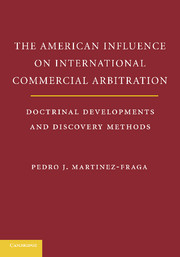"This is an ambitious and innovative approach to a timely topic. It warrants careful attention by all those concerned with international dispute resolution."
--Gary Born, Wilmer Cutler Pickering Hale and Dorr, LLP and author, International Commercial Arbitration (2008)
"An excellent scholarly work that touches upon a controversial issue confronting international commercial arbitration: whether and how to incorporate discovery approaches into the arbitration world."
--Jonathan Schiller, Managing Partner, Boies, Schiller & Flexner LLP
“Pedro Martinez-Fraga’s book is a magnificent portrait of the influence of American legal practice on the conduct of international commercial arbitration. Learned but highly readable, the book does not merely trace the deep impact that developments in international arbitration has had on U.S. law (a treatment that alone makes reading this book worthwhile), but, as the book’s title suggest, shows the impact of traditional U.S. litigation principles and practice on the development of international commercial arbitration. To suppose that the broad availability of discovery in aid of arbitration is the only agent of influence in this direction would be deeply mistaken. While giving that aspect of U.S. influence its full due, Martinez-Fraga moves on to other and no less important terrain of influence, such as the demarcation between arbitral and judicial authority on matters of arbitrability, the binding effect of arbitration agreements and awards on non-signatories, and the interaction between the annulment of awards in the place of arbitration and their recognition or enforcement elsewhere. I unreservedly recommend this book to anyone seriously interested in the interface between international commercial arbitration and U.S. legal practice.”
--George A. Bermann, Gellhorn Professor of Law & Jean Monnet Professor of European Union Law, Columbia University School of Law
“For those seeking an ideal combination of theoretical and practical insights to international commercial arbitration, Martinez-Fraga´s book (“The American Influence on International Commercial Arbitration”) offers a thought-provoking discussion of issues that have been the subject matter of considerable debate and controversy among practitioners, judges, and scholars grounded in different legal traditions.
Tracing the evolution of the concept of “arbitrability”, from Wilko v. Swan to McMahon, the author introduces the reader to the “transformation” of international commercial arbitration into the preferred method for settling international commercial disputes. And the author draws on a rigorous conceptual thinking and a clear theoretical framework in order to discuss the basic tenets which, in his view, distinguish the modern arbitral process from more traditional judicial processes: party autonomy, predictability, party initiative, and discrete and insular judicial intervention in support of arbitration.
Thus, Martinez-Fraga draws on his experience as a seasoned practitioner to present compelling arguments on the use and misuse of pretrial 28 U.S.C. Section 1782(a) type of discovery in the arbitration process. He also relies on a thorough analysis of the most relevant case-law, as well as detailed study of the most relevant arbitration rules (e.g., ICC, ICDR, and LCA Rules) in order to make the case for what Martinez-Fraga envisions as a “new orthodox conception of common law discovery in international arbitration”.
“The American Influence on International Commercial Arbitration” is not limited to discuss the Martinez-Fraga´s own perspectives on “the taking and gathering of evidence”. Nor should this book be regarded, as the title seems to suggest, as the author´s predilection for the proper use of a so-often misunderstood “American style” pretrial discovery. This book also discusses topical issues on international commercial arbitration, such as the use of perjury in arbitration, the proper allocation of arbitral and judicial jurisdiction for determining the validity of the arbitral clause and the main contract containing such clause (discussing the most recent jurisprudential trends on the severability doctrine), and the challenge of the arbitral awards on grounds of “manifiest disregard of the law”. Whether you agree with the author´s views, Martinez-Fraga´s book provides a thoughtful and thorough response to questions which, as the author acknowledges, being far from certain or definitive, tend to “chang[e] at times in fascinating ways that appear to defy man’s wit”.
--Alejandro M. Garro, Professor of Comparative Law, Columbia University





